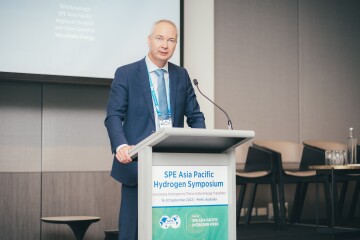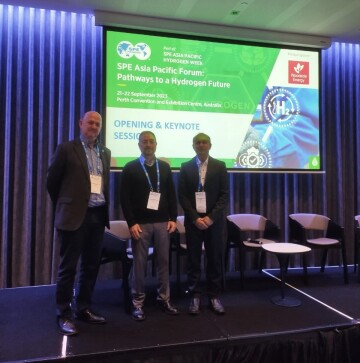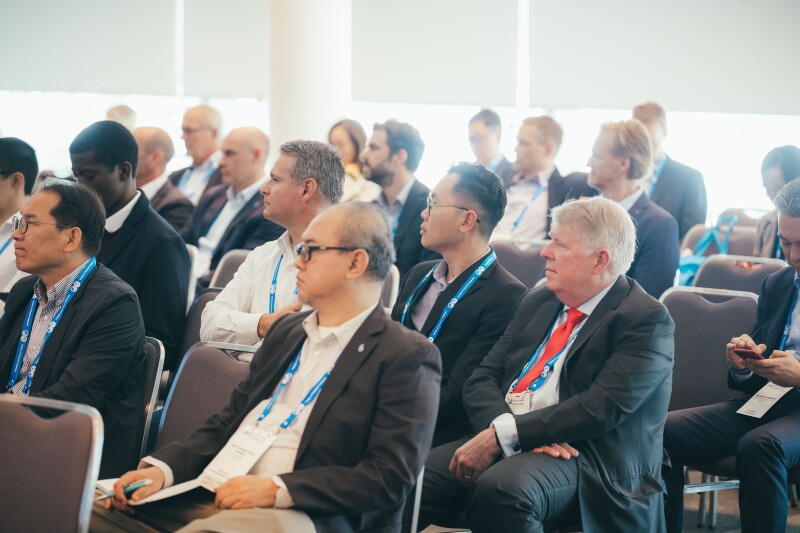SPE organized its first hydrogen symposium and forum during the SPE Asia Pacific Hydrogen Week in September, at the Perth Convention and Exhibition Center, Australia.
Over 4 days, more than 130 attendees from 12 countries offered insights into the evolving hydrogen landscape. Regional experts deliberated on the future of hydrogen, highlighting key opportunities to scale up infrastructure development and investments, optimize existing infrastructures for clean hydrogen supplies, and address challenges in policies, regulations, and low-cost production.

“SPE’s first hydrogen symposium was a great opportunity for a group of diverse and passionate professionals to get together and talk about the issues that matter,” said Menno Weustink, vice president, new energy projects, Woodside Energy, and SPE Asia Pacific Hydrogen Symposium co-chair.
“We know this kind of collaboration is the key to unlocking opportunities in our industry, just as it was in the development of the LNG industry many years ago. We don’t just need new sources of energy, we need entirely new technologies, infrastructure, products, and regulations that do not exist today, or at least need to be modified,” he said.
“During discussions over the 4 days, I was impressed by the great
ideas and the demonstrated collaboration focused towards building this entirely new supply chain.
“I thank SPE for all their efforts developing a program of such productive and interesting sessions, supporting the development of the hydrogen industry in the Asia Pacific region. To me, it’s clear that we’re on the cusp of a new chapter and it’s a fascinating time to be involved,” Weustink said.
Advanced technologies for hydrogen production took center stage, with presentations covering both blue and green hydrogen production methods, focusing on improving efficiency and reducing costs. Innovations in electrolysis, particularly proton exchange membrane technology, and advancements in steam methane reforming were extensively discussed.
Efficient and safe storage and transportation of hydrogen are critical for its widespread adoption. SPE Asia Pacific Hydrogen Week showcased developments in hydrogen refueling infrastructure, pipeline technology, and maritime transportation, illustrating the progress made in creating a regional hydrogen economy.
Attendees also discussed the emerging application of hydrogen, in areas such as power generation, industrial processes, transportation, and heating. The potential of hydrogen fuel cells for powering vehicles and the integration of hydrogen into existing natural gas networks were particularly emphasized, demonstrating the versatility of hydrogen as an energy carrier.
Furthermore, the event addressed the crucial role of government policies and investment in driving hydrogen adoption. Discussions revolved around the development of regulatory frameworks, incentives, and international collaborations to support the growth of the hydrogen economy. Insights into the strategies adopted by countries leading in hydrogen initiatives, including Australia, were provided, offering a roadmap for others to follow.

The SPE Forum 'Pathways to a Hydrogen Future,' which was part of the SPE Asia Pacific Hydrogen Week, was conceived as a frank exchange of ideas on the role that hydrogen will play in a low-carbon energy world; the technical, commercial, and regulatory challenges; and the innovations required to meet them. As intended, the forum resulted in a diversity of freely expressed views that were received critically but respectfully.
Experts and leaders in their fields opened each of the eight sessions over the 2 days of the forum on topics ranging from production, skills transfer, storage/transport, commercial, and the regulatory structures needed to encourage hydrogen innovation and project development. Each session resulted in a lively Q&A, with delegates offering a variety of perspectives.
The fundamental technical challenges associated with the production, storage, and transport of hydrogen was a recurring theme, and two lines of thought were that the future role of hydrogen was necessarily limited and that hydrogen could transform some industries given the intelligent application of infrastructure and associated technologies,” said Chris Kalli, adjunct professor, The University of Western Australia, and co-chair of the forum.
The SPE Asia Pacific Hydrogen Week fostered an environment of networking and collaboration, bringing together stakeholders from academia, industry, and government. The platform facilitated the exchange of ideas, fostering partnerships, and laying the groundwork for future collaborative projects. This networking aspect underscored the importance of a united approach to overcoming the challenges facing hydrogen adoption.

